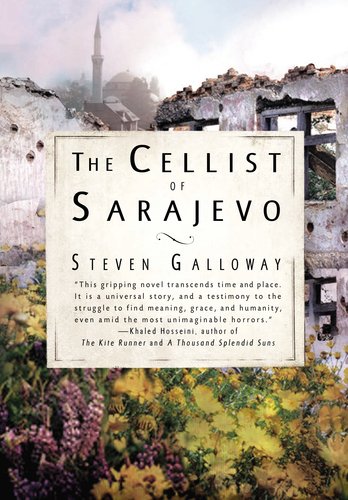All Nonfiction
- Bullying
- Books
- Academic
- Author Interviews
- Celebrity interviews
- College Articles
- College Essays
- Educator of the Year
- Heroes
- Interviews
- Memoir
- Personal Experience
- Sports
- Travel & Culture
All Opinions
- Bullying
- Current Events / Politics
- Discrimination
- Drugs / Alcohol / Smoking
- Entertainment / Celebrities
- Environment
- Love / Relationships
- Movies / Music / TV
- Pop Culture / Trends
- School / College
- Social Issues / Civics
- Spirituality / Religion
- Sports / Hobbies
All Hot Topics
- Bullying
- Community Service
- Environment
- Health
- Letters to the Editor
- Pride & Prejudice
- What Matters
- Back
Summer Guide
- Program Links
- Program Reviews
- Back
College Guide
- College Links
- College Reviews
- College Essays
- College Articles
- Back
The Cellist of Sarajevo by Stephen Galloway
Book Review of The Cellist of Sarajevo
The Cellist of Sarajevo is a historical novel which is written by Stephen Galloway, a Canadian author that now teaches creative writing. His works have been translated into over twenty languages. He is famous for this novel. The novel is set during the Siege of Sarajevo which happened during the Bosnian War. This war was resulted between the Catholic Croats, Orthodox Serbians, and Muslim Bosnians. This siege was the longest and most devastating in the modern warfare.
The book’s three main characters are Arrow, Kenan, and Dragan. These characters are all different because of their ages, jobs and desires but are interconnected through the Cellist who is introduced in the beginning of the novel, as the event is happening which will make him play “Albinoni’s Adagio”. He plays the “Adagio” for 22 days, for the 22 people who were killed by a mortar shell while waiting for bread outside a bakery. This event sets the mood of the book.
The next person we meet is Arrow; she is a sniper. She is independent and has great skill. ‘She can make a bullet do things others can’t’. When we meet her, she is about to kill and describes how she works and her skill, for the reader. After Arrow killed one of the men she has been watching, there is a chase as buildings are hit by mortars to kill Arrow. Most people would have been killed in this chase and bombardment but not Arrow. While reflecting she realizes that that she was different before the war, for it changed her and the people around her. Arrow often reflects how things were before the war, like her time in college. Coming to a conclusion war does not only change surroundings it changes peoples’ identities.
People in the Siege of Sarajevo needed to bring water from the brewery because the water supply did not work at home or the water was bitter. The following person is Kenan who is at home, going off to collect water for his family. Kenan helps his irritable neighbor out of duty but does not want to. On his way back from the brewery, he leaves the neighbors bottles behind, for he doesn’t want to risk his life again. However, he hears the Cellist playing the ‘Adagio’ and realizes that he has been living like a ‘ghost’ which means he only lives to survive. As he returns to his family, he makes a choice to keep living as a ‘ghost’ or not.
Subsequently, Dragan is introduced as he is on his way to the bakery where he works. The way to the bakery includes him crossing many different dangerous alleys and roads all targeted by enemy snipers. He is drawn back into his own world and doesn’t want to interact with any other person. In addition, he is scared of facing the hurt of losing someone he loves. He is only still surviving because he works at the bakery and brings bred home to his sister’s family who give him shelter. While listening to the Cellist he realizes that he should change his way of living.
In conclusion, the book is very interesting, but can also be a little confusing because of the change of narration after each chapter. Often it is hard to remember the events that happened previously of the characters. Furthermore, the book can sometimes be gruesome because of accurate descriptions, like a person being shot in the head and his brains splattering against the wall behind him. The book is written using in media res, books written in media rest can be confusing because the characters are usually not interconnected as in speech or the mentioning of the other character. Media res can also be interesting because the story usually starts during an action scene, as a shelling in The Cellist of Sarajevo. The book is suspense full and interesting; in the end the whole story finishes well and ties the characters together.
Similar Articles
JOIN THE DISCUSSION
This article has 0 comments.

